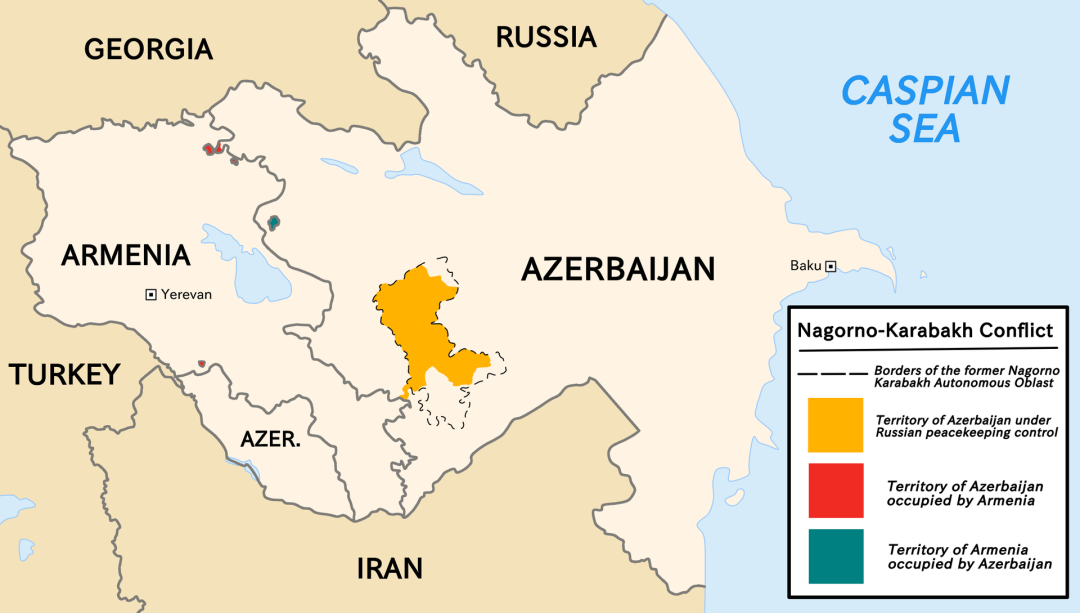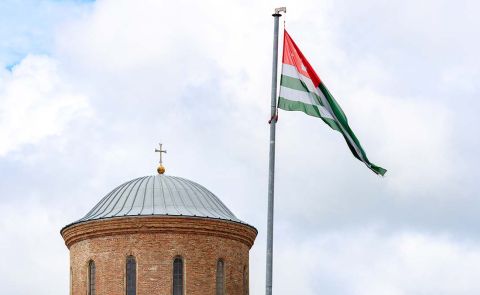
Armenia and Azerbaijan need more confidence-building measures to bring peace to the region

In early July, Azerbaijan released 15 Armenian detainees in exchange for the maps of 92,000 landmines in Fuzuli and Zangilan districts which Baku reclaimed in the war. Azerbaijan's Foreign Ministry said that the swap took place at Russia's initiative and thanked the commander of the Russian peacekeeping force in Nagorno-Karabakh for his mediation in the process. The Armenian government also thanked Russia for its mediation. A similar swap took place earlier in June when Baku released 15 Armenian detainees in exchange for minefield maps, containing information on the location of anti-tank and anti-personnel mines in Aghdam, one of the districts handed over to Azerbaijan based on the November agreement.
The exchange took place on the Azerbaijan-Georgia border with the participation of Georgian representatives. Azerbaijan's Foreign Ministry thanked Georgia, the US, the EU, and the Swedish Chairmanship of the OSCE in getting the deal done. In their turn, the involved regional actors welcomed the steps undertaken by Armenia and Azerbaijan. Furthermore, in their statement the US State Department “also appreciated Russia’s support to regional stability”. Overall, the international community has gathered efforts to alleviate the current tensions between the two countries.
Correspondingly, the victory in the June snap parliamentary elections of acting Armenian Prime Minister Nikol Pashinyan's party opened fresh prospects for the realization of comprehensive peace between the two countries. A new chapter in relations between Azerbaijan and Armenia could be opened and economic integration initiatives and unlocking of all communication links could become a powerful drive moving the region forward towards a sustainable peace and stability in the region. However, it requires some painful concessions from both sides.
Eight months after the 44-days war both Azerbaijan and Armenia are standing at the crossroads. Despite the appearance of relative calm, the current status quo in the region is not as sustainable as it looks. While Moscow pretends that everything is under its control and claims that there is no reason to worry, the increasing number of incidents both on the Armenian-Azerbaijani border and in Nagorno-Karabakh over the past few months tell a different story.
Just recently, the head of Armenia's Security Council Armen Grigoryan, has criticized CSTO Secretary Stanislav Zas over the latter’s remarks that the ongoing border standoff between Azerbaijan and Armenia does not fall under the CSTO’s purview since it is just a border incident with no casualties. Grigoryan argued that the current situation is not just a mere incident since Azerbaijani troops had been in Armenia's territory for quite a long time now, which should be viewed as a clear attempt to annex a chunk of Armenia's sovereign land. Armenia appealed to the CSTO for help after Yerevan announced that the Azerbaijani troops violated Armenia's state border and crossed into its territory on May 12th. Azerbaijan, for its part, claimed that it did not cross into Armenia’s territory, and everything was carried out based on the Soviet maps available for both sides.
While delimitation and demarcation of borders, unblocking regional communications, constructing the Meghri corridor, and signing a peace deal are important to ensure peace between the two sides, it is also obvious that all of these are very complicated processes. To achieve this, Azerbaijan and Armenia should directly talk to each other. But right now, both sides do not seem to be ready for this. For Azerbaijan, the conflict is over and there is nothing to discuss except for the final peace agreement, which is to say that Armenia needs to recognize territorial integrity of Azerbaijan. While Armenian MP Ruben Rubinyan has argued that Armenia will not sign any peace agreement with Azerbaijan without the latter’s recognition of independence of Nagorno-Karabakh, claiming that the presence of Russian peacekeepers in Nagorno-Karabakh will make any new war impossible, Azerbaijani Foreign Minister Jeyhun Bayramov argued that the conflict has been resolved and that the regional countries should focus on the future.
Armenia’s strategy is to show that the conflict is not over and force international actors, such as the OSCE Minsk Group and the CSTO, to get involved. For Azerbaijan, Armenia’s appeal to CSTO over the routine demarcation process that is being deliberately blown up way out of proportion is baseless. This mutual distrust paralyzes the negotiating process, while strengthening only one actor – Russia. Over the years, the only country that Armenia has managed to develop a strategic-level relationship is Russia. After the war, despite the dissatisfaction with Moscow, this notion that Russia is the only country that can ensure preservation of Armenia's statehood has strengthened. In early May, Prime Minister Nikol Pashinyan said that as an additional guarantee for ensuring security of Syunik and Armenia on the whole, the Russian 102nd military base stationed in Gyumri had opened two new military sites in the region. The Armenian government also transferred land plots and property to the Russian border guards of Russia's Federal Security Service (FSB) in the region. There are also talks about the second Russian military base in Armenia that will probably be stationed in Syunik.
Whether these steps stem from Russia’s desire to safeguard its own interests or genuine concerns for Armenia’s national security is an open question. Russia is seeking to achieve its own objectives in the region by making all types of communication and transportation links pass under its own control, and, in this sense, bolstering its presence in Syunik fits into Russia’s strategic vision. However, this does not serve either Armenia’s or Azerbaijan’s national interests, and it certainly doesn’t serve the West’s interests. By pursuing short-term tactical interest, Azerbaijan’s policies are pushing Armenia towards Russia’s arms even further, essentially reducing Armenia’s sovereignty even more, which could have a dramatic blowback effect for Baku itself and limit Azerbaijan’s own room of maneuver vis-à-vis Russia, which Baku has sought to avoid for a long time.
In Yerevan, the concern is that all these processes will be satisfied and implemented first and foremost at the expense of Armenia's interests. Yerevan fears that while most of these developments might contain certain opportunities for Armenia, it could also bear serious risks for the country. However, so far Baku’s actions have not only made it very difficult to build the trust between the two countries, but, more importantly, strengthened the fears in Armenian society. To fix the situation, Azerbaijan should take a first step to show goodwill and return all Armenian detainees. Baku should also abstain from aggressive rhetoric and reassure Armenia that the opening of communication and transportation lines will not be detrimental to Armenia. But most importantly, Baku should start talking with Yerevan directly. The current situation, although far from ideal, has opened up a small but realistic chance to revive the peace process. The return of Armenian detainees, the handover of all maps of minefields, the demilitarization of Nagorno-Karabakh, the delimitation of the border and unblocking of communications and an agreement on the future of Nagorno-Karabakh could finally pave a way for a comprehensive peace treaty, and both sides need to use this opportunity to its fullest extent in order to resolve the conflict once and for all.
Contributed by Igor Dostalik (Czech Republic).
See Also


BP Strengthens Presence in Azerbaijan’s Offshore Energy Sector

Netanyahu’s Letter to Aliyev: Mutual Trust, Solidarity Following Hamas Attacks, Facilitating Dialogue Between Israel and Türkiye

Azerbaijan Expands JF-17 Thunder Fighter Jet Order from 16 to 40 Units

EU Commissioner and NATO PA Warn Georgia Over Democratic Decline Amid Accession Challenges

